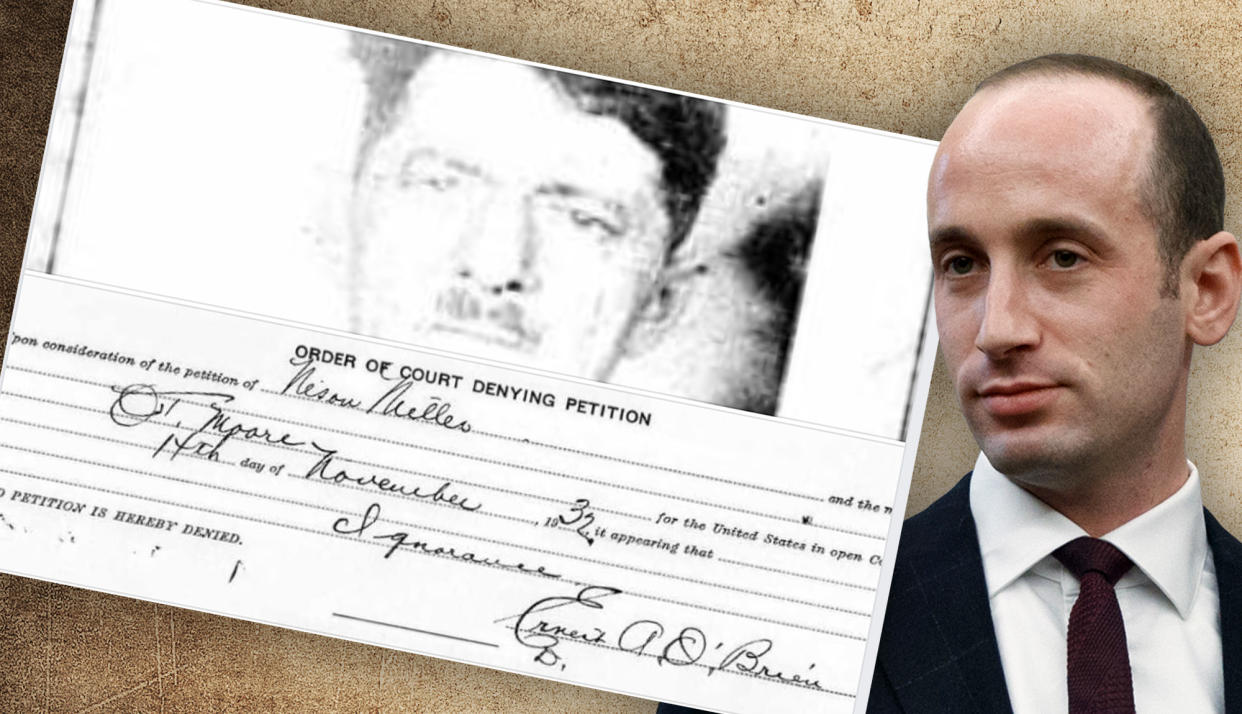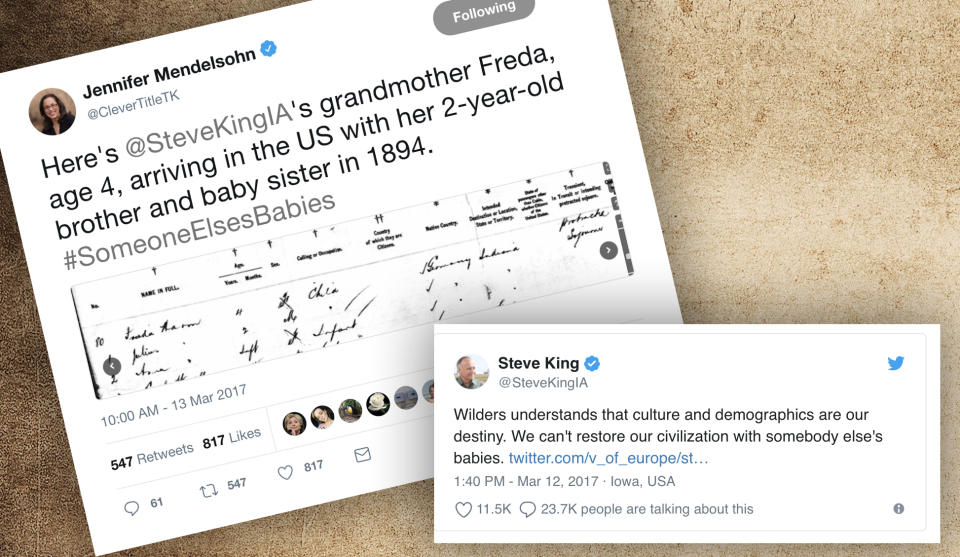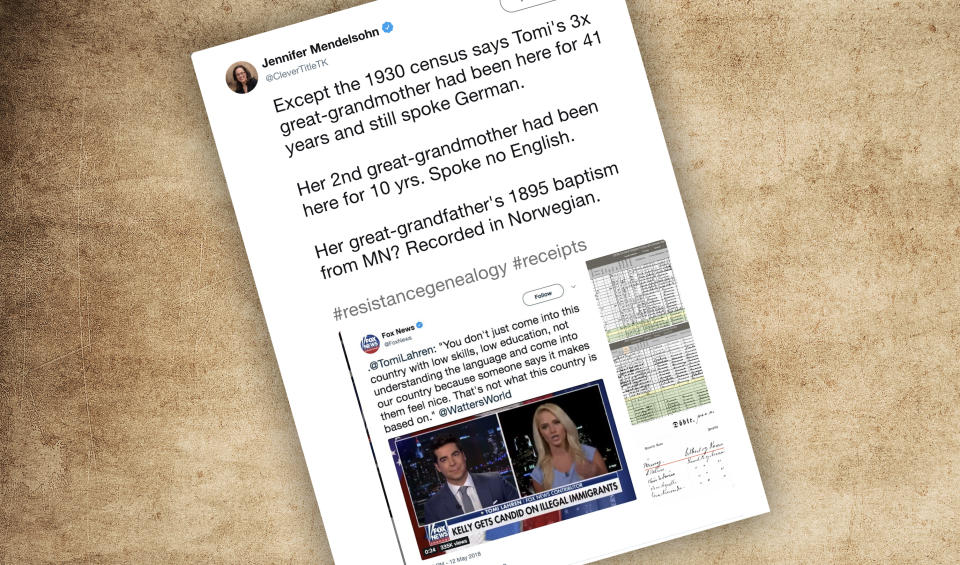Trump aide Stephen Miller, meet your great-grandfather, who flunked his naturalization test

A photo of Nison (aka Max) Miller stares out from the screen, sullen and stern, in faded black and white. “Order of Court Denying Petition” is the title of the government form dated “14th November 1932,” to which it is attached, the one in which Miller is applying for naturalization as an American citizen.
And beneath the photo, the reason given for his denial: Ignorance.
Nison Miller is the great-grandfather of White House adviser Stephen Miller, who has taken credit for being one of the chief architects of the administration’s family separation policy. And this 85-year-old document is just one bit of ammunition in a campaign being waged by the unofficial band that goes by the hashtag #Resistance Genealogy.
Believing that the past is prologue, they search online archives for nuggets about the ancestors of public figures and politicians who disparage today’s immigrants. They use tools they developed as a personal hobby to make the point that people like Miller are holding newcomers to a standard that their own forebears could not meet.
“Unless your ancestors came on a slave ship or you’re Native American,” you came here as an immigrant, says Jennifer Mendelsohn, who created the #resistancegenealogy hashtag last summer after Republican congressman Steve King or Iowa was quoted as saying “We can’t restore our civilization with somebody else’s babies.” So she went on a genealogy website and quickly documented that King’s own grandmother was one such baby, arriving in 1894 from Germany as a 4-year-old, along with her infant siblings.

“The point isn’t to play ‘gotcha,’” says Renee Stern Steinig, a former president of the Jewish Genealogy Society of Long Island, who first found the Miller naturalization application last summer. “It’s to show that we are a nation of immigrants, and you are here because someone else picked up and came here for a better life.” In fact, she is careful to point out that Miller’s great-grandfather being labeled “Ignorant” on that application was probably because he slipped up on a few questions on his citizenship test, not because he was in fact stupid or unworthy of being a citizen — an example of the same harsh, presumptive judgment that she believes is being used against today’s immigrants. Eventually he retook the test and became a citizen.
Another part of Stephen Miller’s family tree seems to have been the first skirmish on this genealogical battlefield. During the summer of 2016, before Steinig found great-granddad Nison, Rob Eshman of the Jewish Journal became intrigued by the apparent hypocrisy of Miller’s description of himself as a grandchild of Jewish refugees while portraying today’s immigrants as dangerous. He reached out to attorney E. Randol Schoenberg, who had famously won the case forcing the Austrian government to return a valuable painting by Gustav Klimt to the Jewish family from whom it had been stolen by the Nazis — the story that was the basis of the 2015 film “Woman in Gold.” Schoenberg has developed an expertise in tracing family histories.
Together he and Eshman followed Miller’s mother’s side (great-grandpa Max was on his father’s side) back to Wolf Lieb Glotzer and his wife, Bessie. That couple arrived from Belarus in 1903 with $8 to their name, escaping anti-Semitic pogroms. In an instance of what today would be called chain migration, they were joined by their son Natan and Wolf’s brother Moses, and eventually by another brother, Sam, who changed his name to Glosser. Sam Glosser was the maternal great-grandfather of Stephen Miller.
Eshman’s article laid out the story, concluding that “Miller demonstrates that in America, truly anything is possible: The great-grandson of a desperate refugee can grow up to shill for the demagogue bent on keeping desperate refugees like his great-grandfather out.”
Eshman went on to pose, and then refute, what has become the most familiar objection to these stories, writing: “But it’s different now, you say. Miller’s forebears came here legally…” It is an argument that Megan Smolenyak, a former chief family historian and spokesperson for Ancestry.com and a regular contributor to the TV series “Who Do You Think You Are?” hears regularly. “It’s a glib, easy response,” she says, “but it ignores history.”
With the glaring exception of the Chinese Exclusion Act, which banned all immigration from that country once its workers were no longer needed to build U.S. railroads, all immigration was legal in America for its first 300 years. So yes, almost everyone who came during those centuries came here legally. Until the early 1920s, all people needed to do to move here was walk off a ship and prove they were basically sane and free of obvious communicable diseases. Had today’s existing and proposed rules been in effect back then, Smolenyak says, a high percentage of the ancestors of current citizens would never have been admitted.
In addition, she says, many who think their ancestors entered completely legally are wrong. Fox contributor Tomi Lahren — who tweeted last year, “We are indeed a nation of immigrants. We are also a nation of laws. Respect our laws and we welcome you. If not, bye” — didn’t know that her great-great-great grandfather had been indicted for forging his naturalization papers until Mendelsohn tweeted that information back to her.

And Rep. Bob Goodlatte of Virginia, the Republican chair of the House Judiciary Committee, whose website states, “I do not support a special pathway to citizenship that rewards those who have broken our immigration laws,” seems not to have known that his grandfather had lied during his naturalization process but was permitted citizenship nonetheless, until Smolenyak found his naturalization papers.
Most interesting to Smolenyak is that this research “is so easy. You don’t have to go very far back.” It’s startling, she says, “how many of the people who are virulently anti-immigration are children or grandchildren or great-grandchildren of immigrants. We should have to work a lot harder for these stories, but there they are, on the lowest, easiest branches.”
She originally expected that such views would be held by people whose stories go further back on the American timeline, but former presidential candidate Mike Huckabee and his daughter, White House press secretary Sarah Sanders, whose roots begin in the 1600s, are the exception. “Most of the rest of the time you think you’re going to have to really dig in and go very far back, you don’t,” she says. “Why are the children and grandchildren of immigrants so eager to keep immigrants out?”
It’s the desire to make that point — “to point out to people who are being needlessly mean and spreading misinformation that they are conveniently forgetting their own family, which in turn means forgetting our national commonality” — that keeps Smolenyak and others in this fight.
It’s why, when Miller said earlier this year that “we favor immigrants who speak English,” Mendelsohn responded with evidence that four years after Miller’s great-grandmother arrived in the U.S. in 1894 she was still speaking Yiddish.

And when Fox host Tucker Carlson asked, “Why does America benefit from having tons of people from failing countries come here?,” Mendelsohn found a memoir from Carlson’s great-grandfather talking about how he left the poverty of Italy for the promise of America.

Or when White House aide Dan Scavino vowed to end “chain migration,” Mendelsohn tweeted: “So Dan. Let’s say Victor Scavino arrives from Canelli, Italy in 1904, then brother Hector in 1905, brother Gildo in 1912, sister Esther in 1913, & sister Clotilde and their father Giuseppe in 1916, and they live together in NY. Do you think that would count as chain migration?”

Or when Lahren recently said, “You don’t just come into this country with low skills, low education, not understanding the language and come into our country because someone says it makes them feel nice. That’s not what this country is based on,” Mendelsohn parried on Twitter with: “Except the 1930 census says Tomi’s 3x great-grandmother had been here for 41 years and still spoke German. Her 2nd great-grandmother had been here for 10 yrs. Spoke no English.”

Ditto for when White House chief of staff John Kelly said on NPR that today’s immigrants are “not people that would easily assimilate into the United States, into our modern society,” because they are uneducated, come from rural areas, and “don’t speak English.” Mendelsohn posted screenshots of documents showing all those things were also true of Kelly’s maternal ancestors.

With every flurry of immigration policy uproar comes a spike in interest in the #resistancegenealogy hashtag. So much research has been done at this point, that often the most active participants merely resurface earlier findings.
When Stephen Miller told the New York Times that the decision to begin separating children from their parents at the border was “simple” (in an interview he gave during what happens to be Immigrant Heritage Month in the U.S.), Steinig’s post about his great-grandfather’s naturalization problems found new life on Twitter.
Or when Goodlatte proposed legislation that would stop the separation of families but still detain children, telling NPR, “It’s very important that people coming to this country not try to enter the country illegally,” Smolenyak reposted her story about his grandfather’s naturalization untruths.
This might look like “weaponizing genealogy,” Smolenyak says, but in fact she believes it is just the opposite.
“The point is our commonality,” she says, “a reminder that this is everyone’s family.” Donald Trump’s grandfather, she noted, came here in part to avoid the draft in his native Bavaria while “his mother came here as a servant. Imagine if they tried to come today.”
Correction: An earlier version of this story failed to include a reference to the Chinese Exclusion Act in the statement “Essentially all immigration was legal in America for its first 300 years.”
_____
Read more from Yahoo News:
Ecstasy-assisted psychotherapy is bringing peace to people with PTSD
Turned away by 2 countries, rescued refugees end their odyssey in Spain
Racial imbalance? Admissions policies at Harvard and Stuyvesant HS under scrutiny
Photos: Children held under Trump administration’s “zero tolerance” illegal immigration policy

